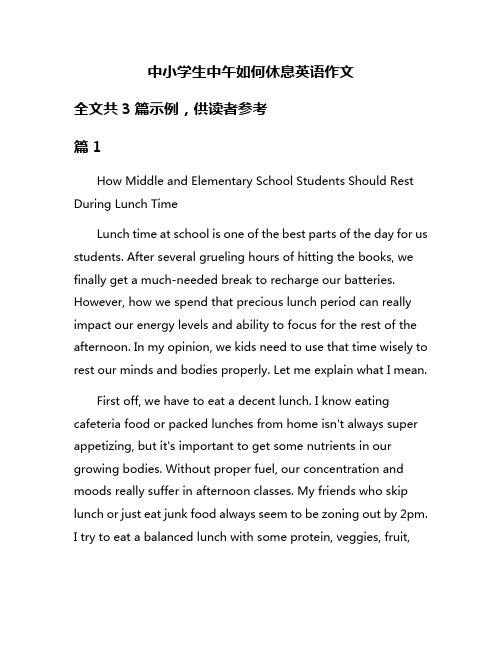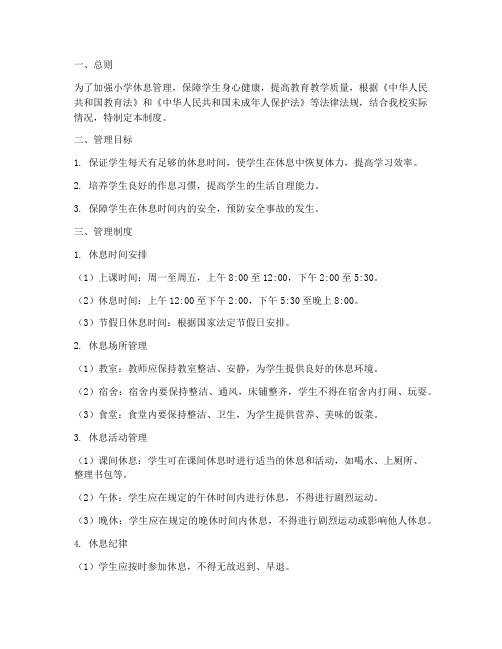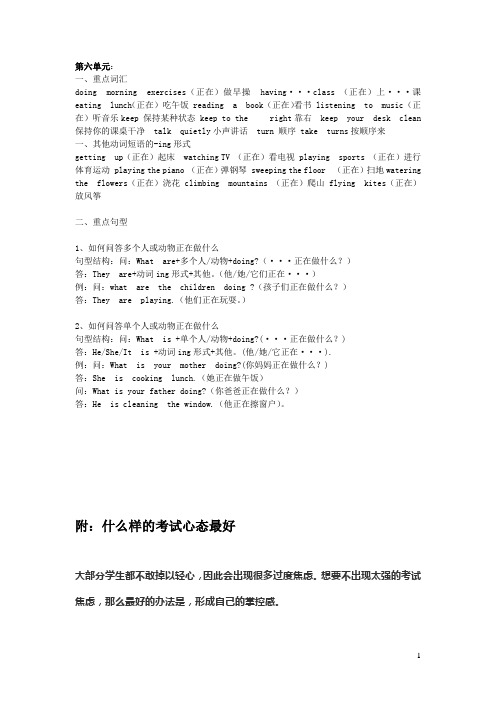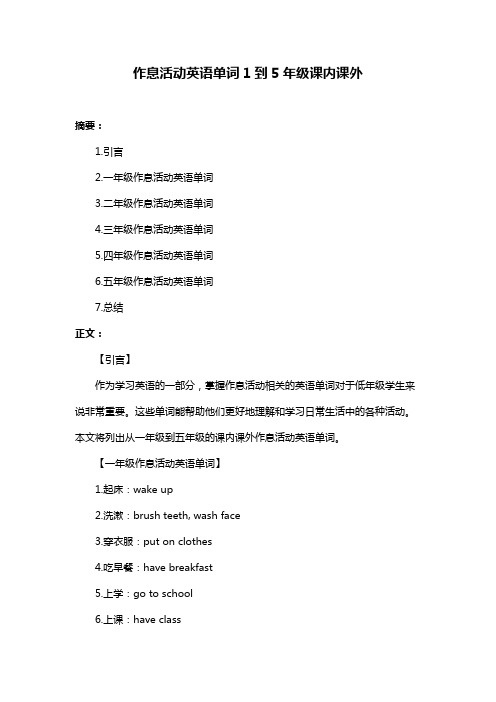小学英语课上“休息”方式种种
中小学生中午如何休息英语作文

中小学生中午如何休息英语作文全文共3篇示例,供读者参考篇1How Middle and Elementary School Students Should Rest During Lunch TimeLunch time at school is one of the best parts of the day for us students. After several grueling hours of hitting the books, we finally get a much-needed break to recharge our batteries. However, how we spend that precious lunch period can really impact our energy levels and ability to focus for the rest of the afternoon. In my opinion, we kids need to use that time wisely to rest our minds and bodies properly. Let me explain what I mean.First off, we have to eat a decent lunch. I know eating cafeteria food or packed lunches from home isn't always super appetizing, but it's important to get some nutrients in our growing bodies. Without proper fuel, our concentration and moods really suffer in afternoon classes. My friends who skip lunch or just eat junk food always seem to be zoning out by 2pm.I try to eat a balanced lunch with some protein, veggies, fruit,and carbs to give me an energy boost without making me feel sluggish.Secondly, and just as crucially, we need to let our minds take a break from schoolwork during lunch. I see so many of my classmates using the entire lunch period to cram for a test, finish homework, or study. While I admire their work ethic, I think this is a terrible idea that leads to burnout. Our brains are like muscles that need rest periods between exercises. If we keep them in mental workout mode all day, we'll just hit a wall eventually. The lunch break is our chance to shut off the academic part of our brains for a little while before we have to ramp it back up again.So if we shouldn't be studying during lunch, what should we do instead? In my view, the ideal lunch period involves a blend of physical activity, socialization, and just zoning out for a bit. Getting some exercise is key, whether that means shooting hoops in the gym, playing frisbee on the field, or even just walking a few laps around the school building. Physical activity boosts our moods, relieves stress, and gets our blood pumping to re-energize us. My friends and I love intramural sports at lunch because it lets us blow off steam while being active.Socializing with friends is another important component. We've all been cooped up in classes all morning, so lunch is a great time to laugh, catch up, and just be silly for a bit. Positive social interaction does wonders for our mental health and sense of belonging at school. Plus, it gives our brains a break from intense cognitive work. As long as we don't get too rowdy or goof off the whole period, some social downtime pays dividends when we need to refocus later.Finally, I'm a big believer in taking some true rest and relaxation at lunch when possible. Whether that means listening to music, reading for pleasure, or honestly maybe even taking a quick nap, we all need pockets of personal time to recharge. Sitting in quiet contemplation for even 10-15 minutes can be remarkably restorative for our overstimulated minds. Often I'll combine this with a little journaling about my day so far as a way to download my thoughts and feelings. It's like hitting the reset button.Of course, every student is a bit different in how they prefer to reinvigorate themselves during the lunch period. Some may need more physical activity, while others crave more social connection. Some simply want Zen-like alone time. The perfect lunch period combines elements of all three - movement,community, and solitude. As long as we're intentional about using that time as a legitimate break, we'll be primed to power through the rest of the academic day feeling refreshed.For all these reasons, I really think schools should encourage students to use the lunch break as crucial downtime rather than just squeezing in more work. We're at much greater risk of mental exhaustion and burnout if we try to plow through anon-stop 7 hour day of intense cognitive lifting. Lunch is our recess, our oasis, when we can hit the reset button before diving back into our studies refreshed and recharged. Honestly, I think my whole outlook and performance in afternoon classes hinges on how well I utilized that previous lunch period to rest my body and mind. It's just as important as the classes themselves. School administrations, parents, and we students need to respect the fundamental importance of a true break at lunch time. Otherwise, we may not be getting the most out of the entire educational experience.篇2How Students Can Rest During the Lunch BreakAs students, we often find ourselves overwhelmed by the demands of school, homework, extracurricular activities, andsocial obligations. Amidst this whirlwind of responsibilities, it's easy to forget the importance of taking a break and recharging our batteries. One of the few opportunities we have during the school day to catch our breath is the lunch break. However, many of us squander this precious time, either mindlessly scrolling through social media or engaging in activities that leave us feeling more drained than refreshed. In this essay, I'll share some tips on how we can make the most of our lunch break and use it as a rejuvenating respite from the academic grind.First and foremost, it's crucial to understand the value of rest and relaxation. Our brains, just like any other muscle in our bodies, require periods of downtime to function optimally. Constant stress and mental exertion can lead to burnout, decreased productivity, and even health issues. By taking a genuine break during lunch, we give our minds a chance to reset, refocus, and prepare for the remainder of the day's challenges.One of the simplest yet most effective ways to rest during lunch is to step away from screens. As tempting as it may be to scroll through social media or watch videos, these activities can be overstimulating and counterproductive to truly unwinding. Instead, consider engaging in more passive forms of relaxation, such as reading a book (for pleasure, not for school), listening tocalming music, or practicing some light stretching or breathing exercises.For those who prefer to be more active during their break, there are still plenty of restorative options. Going for a short walk, either outdoors or around the school premises, can be an excellent way to get some fresh air, clear your head, and even sneak in some light exercise. Alternatively, you could find a quiet spot to practice some gentle yoga poses or engage in mindful coloring or journaling.Another crucial aspect of a restful lunch break is nourishment. It's easy to fall into the trap of hastily consuming a sub-par meal or skipping lunch altogether, but doing so can leave us feeling sluggish and unfocused. Instead, try to pack a nutritious meal that includes a balance of proteins, complex carbohydrates, and healthy fats. Not only will this provide you with sustained energy throughout the day, but taking the time to savor your food can also be a meditative and grounding experience.If you find it challenging to unwind during the lunch break due to social pressures or a noisy environment, consider finding a quiet spot on campus where you can truly escape and decompress. This could be a secluded corner of the library, apeaceful spot in the school garden, or even a quiet hallway or stairwell. Sometimes, simply removing yourself from the hustle and bustle can work wonders for your mental state.For those who prefer to socialize during their break, that's perfectly fine too – just be mindful of the company you keep and the conversations you engage in. Surrounding yourself with positive, uplifting friends and steering clear of gossip or negativity can help ensure that your social interactions are rejuvenating rather than draining.Lastly, it's important to remember that everyone has different preferences and needs when it comes to rest and relaxation. What works for one person might not work for another, and that's okay. The key is to experiment and find what resonates with you personally. Perhaps you'll discover that a combination of activities, such as reading for the first half of lunch and going for a walk in the second half, is the perfect formula for your optimal rejuvenation.In conclusion, the lunch break is a precious opportunity for us students to hit the pause button on our hectic lives and recharge our mental and physical batteries. By making conscious choices about how we spend this time, whether it's through passive relaxation, light physical activity, mindful nourishment, orfinding a quiet sanctuary, we can emerge from our break feeling refreshed, focused, and ready to tackle the rest of the day's challenges. So, let's make a pact to start treating our lunch breaks as sacred self-care rituals, because investing in ourwell-being is not only beneficial for us as individuals but also for our academic and personal growth.篇3How Should We Rest During the Noon Break?Hey friends! Today I want to talk about something that's really important for all of us students - how we spend our noon break at school. We all know that feeling when the morning classes are finally over and we get that blessed free period in the middle of the day. But the way we use that time can really make or break the rest of our day.I don't know about you, but I used to spend most of my noon breaks just kind of wandering around aimlessly, maybe playing a few games on my phone or hanging out with my friends doing nothing in particular. And then I'd go into my afternoon classes feeling just as tired as I was in the morning. It was like the break didn't actually refresh me at all!That's when I realized something had to change. Our noon break is precious time that we need to use wisely if we want to be energized and focused for the rest of the day. So I started experimenting with different ways to recharge my batteries during that break. Here are some of the best tips I've found:Get Some ExerciseThis one might sound counter-intuitive because exercise makes you tired, right? But doing just a little light physical activity can actually boost your energy levels for hours afterwards. Take a short walk around the school grounds, do some jumping jacks or run a lap around the playground. Getting your blood pumping will deliver oxygen and nutrients to your brain so you feel more awake and alert.Eat a Healthy SnackWe've all experienced that post-lunch food coma from eating a huge, greasy meal. Avoid that by packing a light, healthy snack to munch on during the noon break. Something with protein and complex carbs like an apple with peanut butter, some yogurt and granola, or veggie sticks with hummus. These foods will sustain your energy without making you feel sluggish.Practice MindfulnessOur brains are working hard all morning long absorbing new information. Sometimes we just need to give them a break. Spend 10-15 minutes doing a mindfulness exercise like deep breathing, meditation or gentle stretching. This allows your brain to hit the reset button so it's refreshed for your afternoon classes.Get OutsideIf the weather permits, take your noon break outdoors! The fresh air and natural light can be incredibly rejuvenating. Find a nice grassy spot to lounge around on or go for a short walk around the block. Getting outside gets you away from the sights and sounds of the classroom for a little mental break.Read for FunWhen's the last time you read something just because you enjoyed it, not because it was homework? Use your noon break to delve into a novel, comic book or magazine you're interested in. Getting absorbed in a storyline allows your mind to rest while still remaining engaged in something stimulating.Listen to MusicPack some headphones and make a playlist of your favorite pump-up jams or relaxing tunes. Losing yourself in music canimprove your mood and either energize you or help youde-stress, depending on what you need in that moment.Take a Power NapI know, I know - trying to nap at school sounds pretty much impossible. But even just 15-20 minutes of closed-eye rest can provide a nice refresh if you can find a quiet, comfortable spot. Just set an alarm so you don't oversleep!The possibilities are endless for making the most of our noon break time. Of course, you don't have to do the same thing every day - it's all about mixing it up and checking in with yourself to see what your mind and body need.I really think using that break time intentionally has made a huge difference in my academic performance and overall wellbeing. I'm able to be more focused and productive in the afternoons after properly recharging. My brain feelsre-energized instead of spinning in circles from morning fatigue.So there you have it, friends - my plea for us all to use our noon breaks as true restorative breaks! Don't just let that time slip away unnoticed. Be proactive about refueling your mind and body so you can finish each day feeling strong. We all deserve to be at our best!。
暑假英语作息表

暑假英语作息表
暑假英语作息表是一种安排暑假期间学习英语的时间表。
以下是一个简单的暑假英语作息表:
1. 早晨:
- 7:00 起床,进行简单的晨间锻炼
- 7:30 吃早餐,看英文新闻或听英文广播
- 8:00-9:00 读英语小说或文章
2. 上午:
- 9:00-11:00 学习英语语法、词汇或口语课程
- 11:00-12:00 练习英语听力、口语或写作
3. 中午:
- 12:00-13:30 吃午餐,观看英文电影或纪录片
- 13:30-14:30 英语角或英语社团活动
4. 下午:
- 14:30-16:30 英语阅读或英语翻译练习
- 16:30-18:00 学习英语歌曲或进行英语角交流
5. 晚上:
- 18:00-19:30 吃晚餐,观看英文剧集或体育赛事
- 19:30-21:00 复习当天所学内容,进行英语写作练习
- 21:00-22:00 洗漱、阅读英文杂志或书籍
- 22:00 睡觉
这个作息表可以根据个人情况进行调整。
最重要的是保持学习的持续性和规律性,以提高英语水平。
小学休息管理制度

一、总则为了加强小学休息管理,保障学生身心健康,提高教育教学质量,根据《中华人民共和国教育法》和《中华人民共和国未成年人保护法》等法律法规,结合我校实际情况,特制定本制度。
二、管理目标1. 保证学生每天有足够的休息时间,使学生在休息中恢复体力,提高学习效率。
2. 培养学生良好的作息习惯,提高学生的生活自理能力。
3. 保障学生在休息时间内的安全,预防安全事故的发生。
三、管理制度1. 休息时间安排(1)上课时间:周一至周五,上午8:00至12:00,下午2:00至5:30。
(2)休息时间:上午12:00至下午2:00,下午5:30至晚上8:00。
(3)节假日休息时间:根据国家法定节假日安排。
2. 休息场所管理(1)教室:教师应保持教室整洁、安静,为学生提供良好的休息环境。
(2)宿舍:宿舍内要保持整洁、通风,床铺整齐,学生不得在宿舍内打闹、玩耍。
(3)食堂:食堂内要保持整洁、卫生,为学生提供营养、美味的饭菜。
3. 休息活动管理(1)课间休息:学生可在课间休息时进行适当的休息和活动,如喝水、上厕所、整理书包等。
(2)午休:学生应在规定的午休时间内进行休息,不得进行剧烈运动。
(3)晚休:学生应在规定的晚休时间内休息,不得进行剧烈运动或影响他人休息。
4. 休息纪律(1)学生应按时参加休息,不得无故迟到、早退。
(2)学生在休息时间内不得喧哗、打闹,保持安静。
(3)学生不得在休息时间内使用手机、电脑等电子设备。
(4)学生应爱护公共设施,不得损坏。
四、监督检查1. 学校成立休息管理领导小组,负责全校休息管理工作的监督和检查。
2. 各班主任负责本班休息管理工作的落实,定期向学校报告休息管理工作情况。
3. 学校不定期开展休息管理检查,对违反休息管理制度的行为进行严肃处理。
五、奖惩措施1. 对严格遵守休息管理制度的学生,给予表扬和奖励。
2. 对违反休息管理制度的学生,进行批评教育,情节严重的,给予纪律处分。
3. 对在休息管理工作中表现突出的教师,给予表彰和奖励。
PEP人教版小学英语四年级下册第二单元Unit 2 知识点汇总

PEP 人教版英语四年级下册知识点汇总制作:Double Y·LUNIT.2WORD单词1. breakfast 早餐2. English class 英语课3. lunch 午餐4. music class 音乐课5. PE class 体育课6. dinner 正餐7. get up 起床8. go to school 去上学9. go home 回家10. go to bed 上床睡觉单词解析:1.break 打破;休息 fast 快;禁食break(打破)+fast(禁食)=早餐2.English 英语3.PE 体育(physical education,缩写PE或P.E.)4.dinner (中午或晚上吃的) 正餐5.up 向上; 在上面6.go 去 to 向,朝,往go to 去某地7.go home 回家:中间不能加to11. over 结束12. now 现在;目前13. o'clock ……点钟14. kid 小孩15. thirty 三十16. hurry up 快点17. come on 快;加油18. just a minute 稍等一会儿单词拆解:8. clock 时钟9. three 三 third 第三10. hurry 赶快,匆忙 up 向上11. come 来,到达 on 在……上面12. just 正好,不少于minute 分钟, 一会儿breakfast 早餐lunch 午餐dinner 晚餐单词分类记忆English class 英语课music class 音乐课PE class 体育课get up 起床go home 回家go to school 去上学go to bed 上床睡觉over 结束now 现在;目前o'clock ……点钟hurry up 快点come on 快;加油just a minute 稍等一会儿kid 小孩thirty 三十Double Y·L 制 作Knowledge&Grammar知识点及语法What time is it? = What's the time? 现在几点了?二、同义句1. when = what time 什么时候/时间2. supper = dinner 晚饭一、同义词情况方法示例一般情况+s say-says ; run-runs ; get-gets以s、x、ch、sh和o结尾+es watch-watches ; teach-teaches ; go-goes ; do-does 以辅音字母+y结尾变y为i,+es study-studie ; fly-flies 特殊情况不规则have-has三、动词的第三人称单数四、Let's ... (让)我们(做)……吧如:Let's go ! 让我们走吧!Let's go to the playground . 我们去操场吧。
最新新编春五年级英语下册Unit6Workquietly单元知识梳理人教PEP版

第六单元:一、重点词汇doing morning exercises(正在)做早操having···class (正在)上···课eating lunch(正在)吃午饭 reading a book (正在)看书 listening to music (正在)听音乐keep 保持某种状态 keep to the right靠右 keep your desk clean 保持你的课桌干净 talk quietly小声讲话 turn 顺序 take turns按顺序来一、其他动词短语的-ing形式getting up(正在)起床 watching TV (正在)看电视 playing sports (正在)进行体育运动 playing the piano (正在)弹钢琴 sweeping the floor (正在)扫地watering the flowers(正在)浇花climbing mountains (正在)爬山 flying kites(正在)放风筝二、重点句型1、如何问答多个人或动物正在做什么句型结构:问:What are+多个人/动物+doing?(···正在做什么?)答:They are+动词ing形式+其他。
(他/她/它们正在···)例:问:what are the children doing ?(孩子们正在做什么?)答:They are playing.(他们正在玩耍。
)2、如何问答单个人或动物正在做什么句型结构:问:What is +单个人/动物+doing?(···正在做什么?)答:He/She/It is +动词ing形式+其他。
(他/她/它正在···).例:问:What is your mother doing?(你妈妈正在做什么?)答:She is cooking lunch.(她正在做午饭)问:What is your father doing?(你爸爸正在做什么?)答:He is cleaning the window.(他正在擦窗户)。
作息活动英语单词1到5年级课内课外

作息活动英语单词1到5年级课内课外摘要:1.引言2.一年级作息活动英语单词3.二年级作息活动英语单词4.三年级作息活动英语单词5.四年级作息活动英语单词6.五年级作息活动英语单词7.总结正文:【引言】作为学习英语的一部分,掌握作息活动相关的英语单词对于低年级学生来说非常重要。
这些单词能帮助他们更好地理解和学习日常生活中的各种活动。
本文将列出从一年级到五年级的课内课外作息活动英语单词。
【一年级作息活动英语单词】1.起床:wake up2.洗漱:brush teeth, wash face3.穿衣服:put on clothes4.吃早餐:have breakfast5.上学:go to school6.上课:have class7.课间休息:have recess8.午餐:have lunch9.午休:have a nap10.下午课程:have afternoon classes11.放学:finish school12.回家:go home13.做作业:do homework14.晚餐:have dinner15.洗澡:take a bath16.睡觉:go to bed【二年级作息活动英语单词】1.早晨:in the morning2.下午:in the afternoon3.晚上:in the evening4.周末:on weekends5.假期:on holidays6.玩耍:play7.画画:draw8.跳舞:dance9.唱歌:sing10.读书:read11.运动:do sports12.学习:study13.朋友:friend14.家庭:family15.老师:teacher16.同学:classmate【三年级作息活动英语单词】1.一周:in a week2.日期:date3.天气:weather4.季节:season5.月份:month6.年度:year7.生日:birthday8.节假日:holiday9.计划:plan10.愿望:wish11.梦想:dream12.目标:goal13.习惯:habit14.爱好:hobby15.性格:personality16.情感:emotion【四年级作息活动英语单词】1.日常活动:daily activities2.周末活动:weekend activities3.学校活动:school activities4.社区活动:community activities5.节日活动:holiday activities6.环保活动:environmental activities7.志愿者活动:volunteer activities8.运动活动:sports activities9.文化活动:cultural activities10.科技活动:tech activities11.艺术活动:art activities12.音乐活动:music activities13.戏剧活动:drama activities14.公益活动:public welfare activities15.郊游活动:outdoor activities16.学习活动:learning activities 【五年级作息活动英语单词】1.早晨:in the morning2.下午:in the afternoon3.晚上:in the evening4.周末:on weekends5.假期:on holidays6.玩耍:play7.画画:draw8.跳舞:dance9.唱歌:sing10.读书:read11.运动:do sports12.学习:study13.朋友:friend14.家庭:family15.老师:teacher16.同学:classmate【总结】通过掌握这些作息活动英语单词,学生可以在日常生活和学习中更好地运用英语。
暑假英语作息时间表

以下是一份暑假英语作息时间表的示例:
早上:
8:00 - 8:30:起床、洗漱
8:30 - 9:00:早餐
9:00 - 10:00:英语听力练习
10:00 - 11:00:阅读英语文章
上午活动:
11:00 - 12:00:英语写作练习
12:00 - 13:00:午餐休息
下午:
13:00 - 14:00:英语词汇学习
14:00 - 15:00:在线英语课程学习
15:00 - 16:00:口语练习
16:00 - 17:00:英语影视欣赏
傍晚:
17:00 - 18:00:户外活动(如跑步、骑自行车等)18:00 - 19:00:晚餐休息
晚上:
19:00 - 20:00:英语语法学习
20:00 - 21:00:英语听力练习
21:00 - 22:00:阅读英语书籍
晚上活动:
22:00 - 22:30:复习一天学习内容
22:30 - 23:00:放松活动(如听音乐、看电视等)
23:00:就寝
请注意,这只是一个示例时间表,你可以根据自己的实际情况和偏好进行调整。
同时,为了避免学习过度疲劳,合理安排休息时间也非常重要。
记得在学习之余留出时间进行休闲活动和社交交流,保持身心健康的平衡发展。
外国小学生作息时间

外国小学生作息时间制定作息时间可以参考别人的,那么你知道外国小学生的作息时间是怎样安排的吗?下面店铺告诉你外国小学生是如何安排作息时间的。
外国小学生作息时间:日本日本的小学生早晨到校时间比国内稍晚,一般都是早上8时30分左右,每天基本都是六节课的安排,下午3时45分左右放学。
除了正式上课之外,一天内还会有很多其他安排,例如打扫卫生、校内午餐、委员会议及参加俱乐部活动等。
家长不需要操心接送目前,在国内几乎每个孩子的上学放学都要由家长负责接送。
日本则完全不同,小学生们上学和放学时一般是与住得较近的同学一起走或由大班的孩子负责带领,家长根本没有专程接送的必要。
在每所小学的校门外的马路上,都会用醒目的颜色画出几十米长的彩色标志,提示过往车辆在此区间内必须耐心等候或慢行,而在孩子们上学放学路途中必经的一些交通要道和人行横道附近往往也有轮流值班的家长维持秩序,保障安全。
此外,在一些繁华的城市街道上,还设置有专门的“通学路段”,在小学生们上学和放学的时间段中进行交通管制。
因此,即使没有专门接送,小学生的安全也不须家长过多操心。
日本的小学分为公立学校和私立学校。
根据日本法律规定,公立学校必须对学生实施免费教育,其中包括了教材费和设施费。
私立学校因为收费高,所占的比重很小。
教育资源分配合理在日本,小学是不分重点与非重点的。
各个学校的设备均按全国统一标准配备,即使是山区学校的设备和东京都内的小学的设备也毫无二致。
日本的小学一般每个年级设有两个班,每班20到30人左右。
每所学校都有一栋教学楼,一个体育馆,一个运动场,一个游泳池。
日本的小学基本都实行“学区入学制”,即我们所说的划片就近入学。
日本政府要求每隔五年对各校的校长和老师进行一次大换班,这样便较好地避免了形成事实上的重点学校,也从客观上减轻了部分家长对学校间差距的担心。
此外,为了保证智力障碍儿童的上学,每所小学一般都设有“向日葵”班,保证他们受教育的权利。
中学时,这些智力障碍的儿童则会被安排进入各个行政区设立的学校进行特殊教育。
- 1、下载文档前请自行甄别文档内容的完整性,平台不提供额外的编辑、内容补充、找答案等附加服务。
- 2、"仅部分预览"的文档,不可在线预览部分如存在完整性等问题,可反馈申请退款(可完整预览的文档不适用该条件!)。
- 3、如文档侵犯您的权益,请联系客服反馈,我们会尽快为您处理(人工客服工作时间:9:00-18:30)。
小学英语课上“休息”方式种种
小学英语课是一种活动课,是在一定的情景下完成教学任务的。
小学生年龄小,有意注意时间短。
一节课中往往开头一部分时间坐得端正、听得认真,后面开始操练时就没有节制地“活动”了。
这时候,可以利用小学生个个争强好胜的心理。
“比比哪个小朋友表现最好”。
但这也只能持续一小段时间。
我发现其实课上给出更多时间让他们“休息”,接下来的纪律会上一个台阶。
总结出来“休息”方法如下种种:
一、听口令做动作
这样的形式学生们非常喜欢。
口令有“Stand up. Touch your hair. Turn left.”等。
活动身体的各个部位可以缓解坐姿不正带来的疲劳。
二、画画
可叫学生每人准备一张纸,按老师的要求画画涂色。
如”Draw a desk . Colour the desk pink.”这样不仅复习了实物、颜色“desk ,pink”,还加强了学生动手绘画技能。
三、说说唱唱
全体学生一齐起立唱歌或说歌谣,并加上一定的动作,如“Apple tree,apple tree,a big apple tree. Please drop a big apple down for me.”边说边做出形容苹果很大,以及摘苹果的动作。
可以稍微夸张一些,学生们会更喜欢。
四、欣赏歌曲
干脆让学生静息,听一些比较纯正的英文儿歌,可以让他们跟着默默地唱,营造这样一种氛围,体会这种语言的美丽,加强语音、语调方面的感觉。
